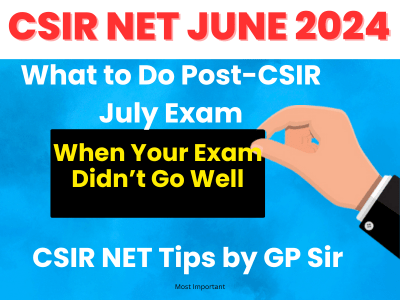
What to Do Post-CSIR July Exam When Your Exam Didn’t Go Well
Facing disappointment after a challenging exam like the CSIR July exam can be tough. However, it’s crucial to turn this experience into a stepping stone for future success. In this blog, we’ll discuss practical steps you can take to bounce back stronger and more prepared.
Table of Contents
- Introduction
- Analyze Your Weaknesses
- Learn from Mistakes During Exam
- Be Positive
- Set Practical Goals
- Take Care of Your Health
- Conclusion
Introduction
The CSIR July exam is known for its rigorous standards and comprehensive coverage of scientific subjects. When the results don’t meet your expectations, it’s easy to feel defeated. However, it’s important to remember that this setback can be a powerful learning opportunity. By systematically addressing your weaknesses, learning from your mistakes, and maintaining a positive outlook, you can significantly improve your performance in future exams. This guide provides actionable steps to help you navigate the post-exam period and prepare effectively for your next attempt.
Analyze Your Weaknesses
Identify Problem Areas: The first step in improving your performance is to clearly identify where you went wrong. Take time to reflect on the exam and recognize the specific sections or topics that were particularly challenging for you. Was it the complex problems in Real Analysis, the intricate theories in Modern Algebra, or time-consuming Differential Equations that tripped you up?
Review Your Performance: If possible, obtain a copy of your answer sheet or recall the questions you found difficult. Analyzing your responses can help you understand the nature of your mistakes. Did you misinterpret the questions, make calculation errors, or simply run out of time? Understanding these nuances will guide your future study efforts.
Seek Feedback: Don’t hesitate to discuss your performance with mentors, teachers, or peers who have a good understanding of the CSIR exam pattern. Their insights are valuable and can provide you with perspectives, highlighting areas you might have overlooked. Engaging in group discussions can also expose you to different problem-solving techniques.
Learn from Mistakes During Exam
Common Pitfalls: Reflect on the common pitfalls you encountered during the exam. These might include not managing your time effectively, misreading questions, or making errors in calculations. By identifying these recurring issues, you can create strategies to avoid them in the future.
Develop Strategies: Once you’ve identified your mistakes, it’s time to develop strategies to overcome them. For instance, if you struggled with time management, practice solving questions within a set time frame. If you made calculation errors, focus on practicing accuracy and rechecking your work. Tailor your strategies to address your specific weaknesses.
Mock Tests: Regularly taking mock tests under exam conditions can be immensely beneficial. Mock tests help you get accustomed to the pressure of the actual exam and allow you to practice your newly developed strategies. Analyzing your performance in these tests can further fine-tune your preparation.
Be Positive
Stay Optimistic: Maintaining a positive attitude is crucial for your mental well-being and future performance.It’s crucial to remember that one exam does not determine your abilities or future success. Embrace a growth mindset and view this experience as a learning opportunity rather than a failure.
Motivate Yourself: Surround yourself with supportive friends, family, and mentors who can help keep your spirits up. Positive reinforcement from your support system can boost your morale and keep you motivated during your preparation.
Reflect on Successes: Don’t forget to acknowledge the parts of the exam that went well. Celebrate your small victories, whether it’s a question you answered correctly or a topic you mastered. Recognizing your strengths will boost your confidence and help you stay motivated.
Set Practical Goals
Short-Term Goals: Set achievable short-term goals that can help you make steady progress. These could include mastering a specific topic, improving your problem-solving speed, or increasing your accuracy. Dividing your preparation into smaller, manageable tasks can make it feel less overwhelming.
Long-Term Goals: Keep your long-term goal in mind, such as clearing the next CSIR exam with a higher score. This overarching goal will help you stay focused and motivated throughout your preparation journey. Visualize your success and work towards it with determination.
Track Progress: Maintain a record of your progress to monitor your improvement. This not only helps you stay on track but also boosts your confidence when you see how far you’ve come. Regularly review and adjust your goals based on your progress to ensure continuous improvement.
Take Care of Your Health
Physical Health: Your physical well-being plays a significant role in your mental performance. Make sure you are consuming a balanced diet, exercising regularly, and getting adequate sleep.Physical activity and proper rest can enhance your focus and energy levels.
Mental Health: Managing stress and anxiety is crucial during this period. Practice relaxation techniques such as meditation, yoga, or deep breathing exercises to maintain a calm and focused mind. Taking care of your mental health will improve your overall productivity and well-being.
Breaks: Avoid burnout by taking regular study breaks. Short breaks are rejuvenating for your mind and boost concentration. Use this time to relax,or spend it with loved ones. A well-rested mind is more productive and efficient aftterall.
Conclusion
Experiencing disappointment after a challenging exam like the CSIR July exam is natural, but it’s essential to use this setback as a learning opportunity. By analyzing your weaknesses, learning from your mistakes, and maintaining a positive outlook, you can significantly improve your future performance. Set practical goals, take care of your health, and remember that every setback is a setup for a comeback. With determination and the right strategies, you can turn this experience into a stepping stone toward success.
By following these steps, you’ll be better equipped to tackle future challenges and improve your performance in upcoming exams. Stay positive and focused, while always pushing forward!
Also check:
Courses Offered:
Buy our best-selling books on Flipkart and Amazon
Flipkart Combat Test Series CSIR-NET/JRF/Mathematics By Dr. Gajendra Purohit, GPS PUBLICATIONS – click here
|
Tag:Academic Success, Analyzing Weaknesses, CSIR exam tips, CSIR July Exam, csir net, Exam Performance, Exam Preparation, Exam Stress, Future Exams, gp sir, Health and Wellbeing, Learning from Mistakes, Mental Health, Mock Tests, Motivation, Overcoming Failure, Physical Health, Positive Mindset, Post-Exam Strategies, Preparation Tips, Re-Exam Chances, Setting Goals, Study Plan, Study Techniques, Study Tips, time management






